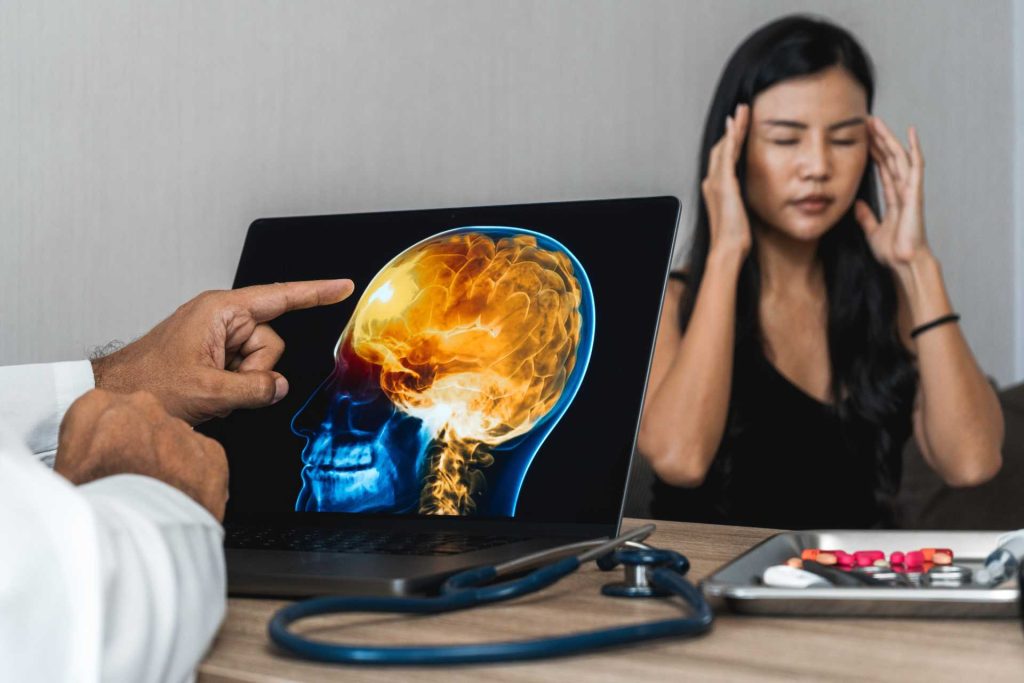A traumatic brain injury (TBI) is a serious condition that can result from a sudden blow or jolt to the head, commonly occurring during car accidents. When the brain is impacted in such a way, it can cause a range of injuries, including concussions, contusions, and more severe forms of brain damage. These injuries can vary in severity, but even a mild TBI requires prompt attention and care to prevent long-term consequences. Recognizing the signs of a traumatic brain injury from a car accident early is critical for effective treatment and recovery.
Common Symptoms of Traumatic Brain Injury from a Car Accident
After a car accident, symptoms of a traumatic brain injury may not always be immediately apparent. They can develop gradually over hours or even days, which is why it is vital to be vigilant about any changes in your physical or mental state following the accident. The severity of symptoms can range from mild to severe, depending on the extent of the injury.
1. Persistent Headaches and Dizziness
One of the most common signs of a TBI is a persistent headache. This headache might start shortly after the accident or develop hours or even delayed, showing up days or months later. The pain can range from mild to severe and may be accompanied by dizziness or a sensation of spinning. These symptoms should not be ignored, as they may indicate that the brain has been injured. Dizziness, in particular, can signal that the brain’s balance centers have been affected, which is often a sign of more serious underlying damage.
2. Memory Problems and Confusion
Memory issues and confusion are other hallmark signs of a traumatic brain injury. After a car accident, you might find it difficult to remember recent events, conversations, or even the details of the accident itself. Confusion can manifest as difficulty understanding your surroundings, struggling to follow instructions, or feeling disoriented. These symptoms can be subtle at first but tend to worsen over time if not addressed. Memory problems and confusion are serious indicators that the brain is not functioning properly and should prompt immediate medical evaluation.
3. Sensitivity to Light and Sound
Increased sensitivity to light (photophobia) and sound (phonophobia) can develop following a traumatic brain injury. These symptoms can make everyday activities, such as being in bright rooms or hearing loud noises, uncomfortable or even painful. This heightened sensitivity often accompanies other symptoms like headaches and dizziness, further indicating that the brain has been impacted. It is important to monitor these symptoms closely, especially if they persist, as they could be signs of a more severe brain injury.
4. Mood Changes and Emotional Instability
Mood changes are common after a traumatic brain injury. You might experience unexplained irritability, sadness, anxiety, or even sudden mood swings. These emotional changes can occur without any clear trigger and may be out of character for you. Emotional instability can be a direct result of damage to the areas of the brain that regulate emotions, and it is essential to recognize these changes as potential signs of a brain injury. Early intervention can help manage these symptoms and prevent them from worsening.
5. Difficulty Concentrating and Focusing
Difficulty concentrating and focusing is another common symptom of TBI. After a car accident, you might find it hard to stay on task, follow conversations, or complete activities that require mental effort. This lack of focus can impact your ability to work, study, or even manage daily responsibilities. These cognitive difficulties are concerning because they can significantly affect your quality of life and indicate that the brain is struggling to function normally.
6. Physical Symptoms: Nausea, Vomiting, and Fatigue
Physical symptoms like nausea, vomiting, and fatigue are also associated with traumatic brain injuries. Nausea and vomiting can occur as a result of the brain’s response to injury, particularly if the parts of the brain responsible for balance and coordination are affected. Fatigue, on the other hand, is a common response to brain injury, as the body works harder to recover from the trauma. These symptoms can be particularly distressing and should be taken seriously, as they often indicate that the brain is under significant strain.
When to Seek Medical Attention for Possible TBI

It is important to seek medical attention as soon as possible if you suspect you have sustained a traumatic brain injury from a car accident. Even if symptoms appear mild, early diagnosis and intervention are key to preventing long-term damage. If you experience persistent headaches, dizziness, memory issues, or any of the other symptoms mentioned above, it is essential to consult a healthcare professional.
Immediate medical evaluation is particularly important if you lose consciousness at any point after the accident, experience seizures, or notice any changes in your behavior or cognitive abilities. These symptoms could indicate a more severe brain injury that requires prompt treatment.
How AICA Orthopedics Helps Treat Brain Injuries After a Car Accident
AICA Orthopedics provides comprehensive care for individuals who have suffered brain injuries from car accidents. Our multidisciplinary team, including neurologists, orthopedic doctors, chiropractors, and physical therapists, collaborates to create a personalized treatment plan tailored to your specific needs. During your visit, we conduct a thorough physical examination and discuss the details of your accident and symptoms. Diagnostic tests like MRI or EEG may be recommended to assess the extent of your injury, followed by an initial treatment plan that could involve medication, physical therapy, and follow-up visits.
Our primary goal is to guide you through every step of your recovery, ensuring you receive the best possible care. From the initial consultation to ongoing treatment, AICA Orthopedics is committed to helping you regain your health and well-being. If you or a loved one has experienced a traumatic brain injury from a car accident, don’t wait to seek help. Contact AICA Orthopedics today to schedule an appointment and start your journey toward a full recovery.





